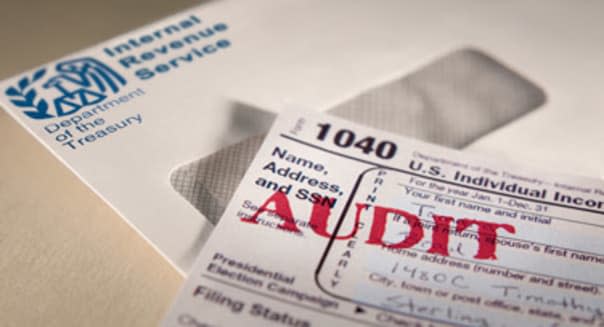To Avoid an IRS Audit, Steer Clear of These Red Flags

Ever since the advent of email, the content of our home mailbox has become less important. Rarely do we find anything sandwiched between the mounds of multicolored junk mail we get each day that warrants our attention, the exception being wedding invitations and IRS notices.
As terrifying as the prospect of attending your second cousin's wedding might be, it's an easy fix -- send your regrets and a $50 Target gift card, and you're off the hook. However, an invitation to an IRS audit isn't something you can refuse, so it's best to never get one in the first place.
Most people will tell you they know someone who got audited by the IRS, but despite the seemingly widespread occurrence, the average American has only about a 1 percent chance of getting audited. That percentage climbs as your income climbs, with those making more than $10 million a year having a 27 percent chance of an audit -- bad news for Brad Pitt and Angelina Jolie.
But according to David Knecht, a partner at CPA-firm Milam, Knecht & Warner in Glendale, Calif., there are red flags the IRS looks for that increase your chances of an audit, no matter what your income level is, and avoiding those will help make sure you never have to look an IRS agent in the eye.
Measure Twice, Cut Once
"First," says Knecht, "double- and triple-check all your numbers. When you're inputting your W-2 or 1099 amounts into whatever software you're using, make certain they're correct.
"IRS computers have the ability to cross-check your numbers against those reported to them by employers, banks, mutual funds, stock brokers, etc. %VIRTUAL-article-sponsoredlinks%So this rule goes for W-2s, K-1s, 1099s, 1098s and any other type of income or expense that you receive notification of from third parties."
If the IRS has 1099 information from a mutual fund or from a casino where you hit a jackpot on a trip to Vegas, and you're missing that on your return, their computers will pick it up. At a minimum, you'll get a letter from the IRS asking about the missing information. At the worst, you'll find yourself face-to-face with an auditor.
Stay Within the Norm
In the quest to lower taxes, some filers get creative with their deductions, but these will be seen as aberrations to the IRS.
For example, deducting some of your automobile expenses for business is OK, but taking a 100 percent deduction is going to draw unwanted attention. "The IRS doesn't believe that anyone has 100 percent business use of a personal auto," Knecht says.
He adds that other things -- such as deducting hobby losses, outsized charitable contributions, interest expenses, and other itemized deductions -- will most certainly raise a red flag.
What's more, most of the things you can do to avoid an audit come down to common sense.
"While there are a lot of rules governing what constitutes a legitimate business purpose and therefore deductibility," says Knecht, "a general rule of thumb is that to be deductible, an expense needs to have a reasonable connection to your business. If it can't pass the smell test, it's probably a loser.
"If you're concerned about getting audited," he says, "report everything, report it correctly, be reasonable in amounts reported and maintain your documentation, just in case."
No man is an island, or even a peninsula, so I encourage your feedback in the comments below. And don't forget to pick up my book, "Trading: The Best of the Best -- Top Trading Tips for Our Time."
More from Brian Lund
3 Unusual Ways to Tell the Stock Market Is Headed for a Fall
What One Stock Expert's Epically Bad Prediction Teaches Us About Investing


